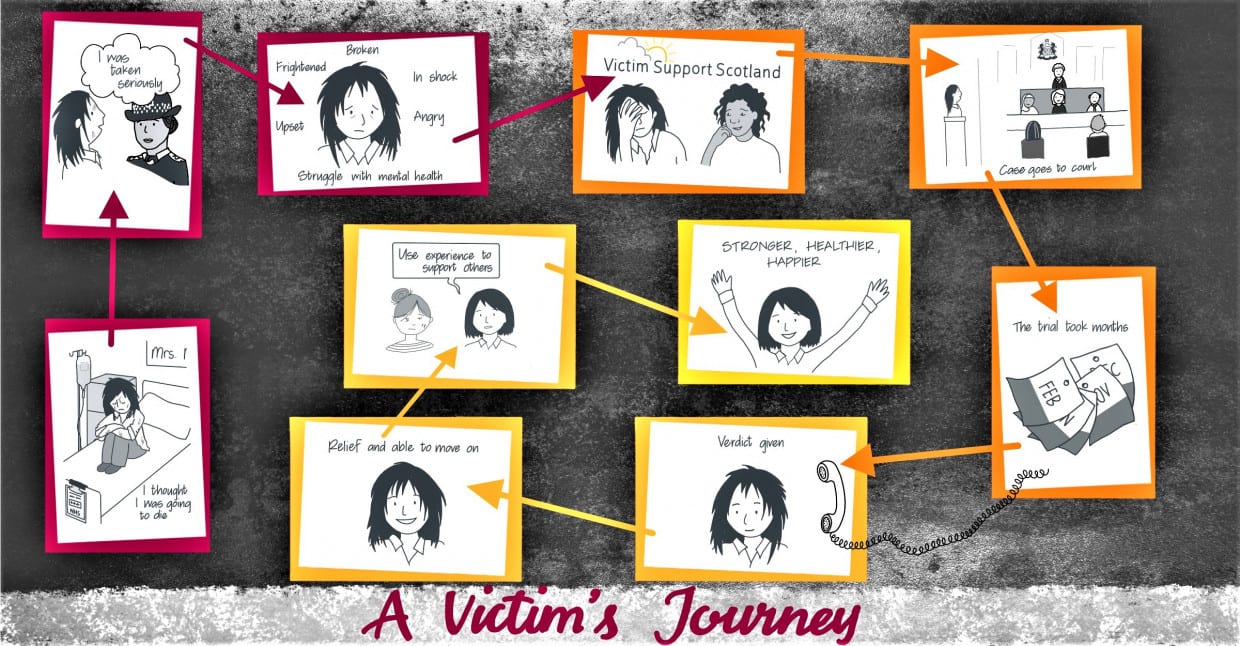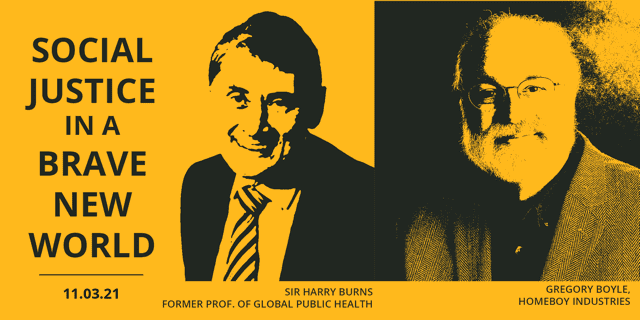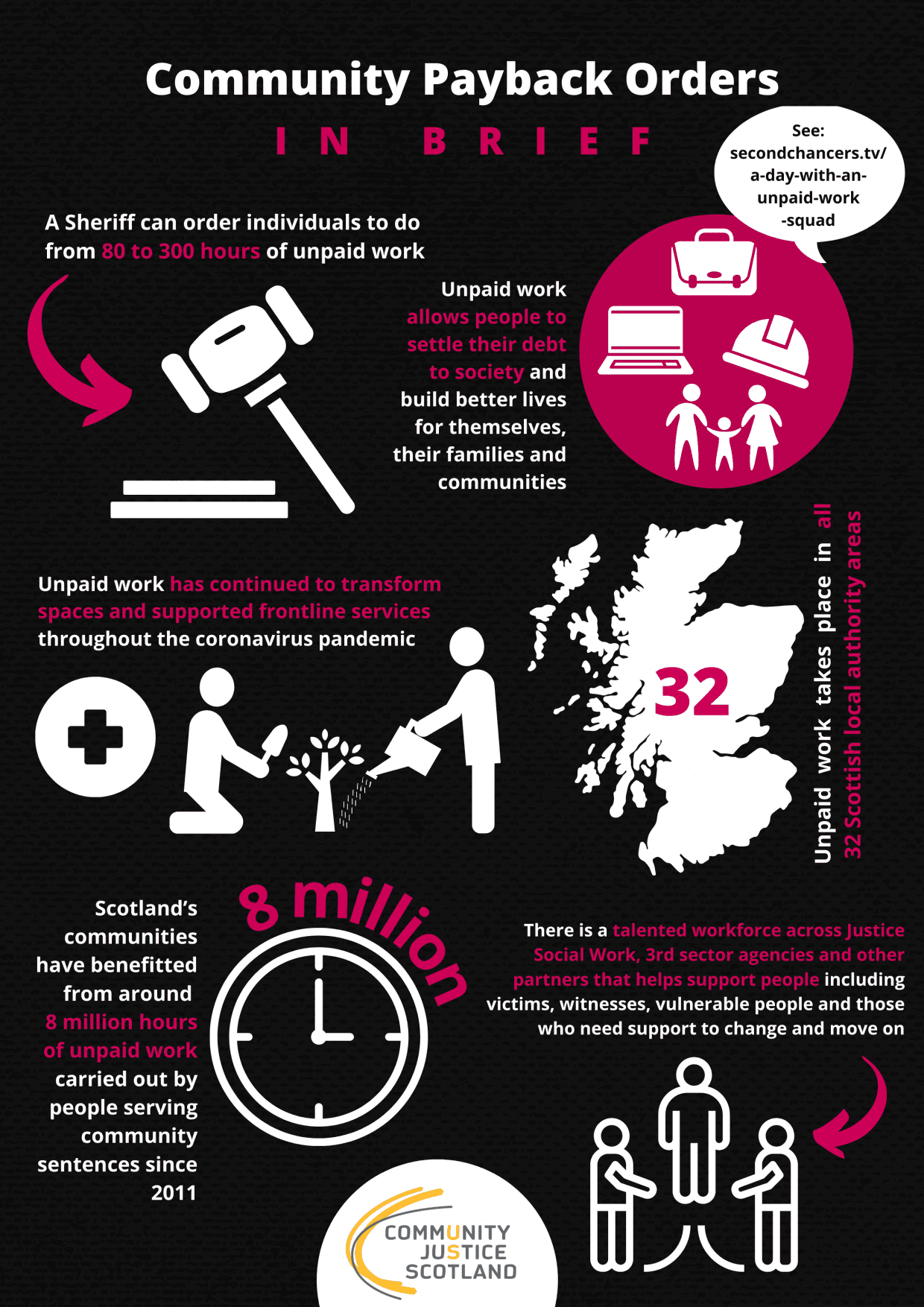Official response to NRS stats release: Scotland’s drug deaths 2020
Quote relating to drug death stats in Scotland for 2020, released by NRS on 30 July 2021
Bill Fitzpatrick, director of operations at Community Justice Scotland, said:
“Drug addiction is the most visible symptom that led to the deaths of these 1,339 people in 2020. But in reality many died of hopelessness, trauma and missed opportunities.
“Addiction tears families apart and leaves a legacy of hurt and devastation. It shouldn’t be a death sentence. Many do recover and families can be repaired but only if people are provided with the opportunities and appropriate support to do so.
“This latest figure is an increase in 5 per cent on 2019 – but we shouldn’t lose sight that these numbers represent real people, who have had their futures wiped out by addiction. We need to view this as the public health crisis it is.”
Members Reappointed to Community Justice Scotland’s Board
The Cabinet Secretary for Justice and Veterans, Keith Brown MSP, has announced the reappointments of Adam Burley, Alec Spencer, Graham Bell and Steve Kirkwood as Members of the Community Justice Scotland Board.
These reappointments will be for three years. The terms will begin on 15 October 2021 and run until 14 October 2024.
These reappointments are regulated by the Ethical Standards Commissioner.
For more information, see: Public appointments: news releases – gov.scot (www.gov.scot)
Audit Scotland Report: Community justice: Sustainable alternatives to custody
On 15 July 2021, Audit Scotland released this report on community justice: sustainable alternative to custody.
Karyn McCluskey, Chief Executive, Community Justice Scotland comments:
“I welcome Audit Scotland’s focus on community justice and its recognition that community justice can be transformative for individuals and communities.
Make no mistake, there are public and third sector workers all over Scotland doing the most extraordinary work, in the most difficult circumstances. They are preventing offending and helping people to change their lives. They are hidden away but show extraordinary resilience in supporting many complex people in communities.
However, we have a strong body of evidence around what works to reduce offending, but it is not being used consistently. We have highlighted this in our annual reports for the last number of years. We cannot have this inconsistency – it must matter to all of us.
Now is the time to transform the system. We must step up and embrace a radical paradigm shift into prevention – preventing victimisation and making Scotland the safest country. We must ensure that the right people are in place, in the right numbers with the right support to deliver this. It must also be accountable – if everyone is accountable, then no one is – and this must change.
We must imprison those whom we are afraid of, and not those we are mad at. People enter our justice system with mental health issues, addiction problems, homeless, from the care system and many who’ve been victimised as children – addressing problems and solutions in a community setting is key to transforming lives – both of victims and those who have offended. We should have the confidence that we can do this consistently and to a high standard across Scotland.”
Glenys Watt, Acting Chair, Community Justice Scotland said of the report:
“I am pleased that Audit Scotland have repeated some of the findings contained in the Community Justice Scotland outcomes annual reports for the last few years.
We have highlighted the need for greater consistency in service provision across Scotland and for clearer accountability. Hopefully this report will support progress towards a more preventive approach.”
Editors notes
- Launched on 1 April 2017 by the Community Justice (Scotland) Act 2016, Community Justice Scotland (CJS) is the national body for community justice in Scotland.
- Community Justice Scotland’s remit is wide-ranging and includes:
- Providing leadership, training and insight to support partners to prevent offending and reduce the number of future victims.
- Changing the conversation about justice, increasing understanding and support for what will make Scotland better for all of us.
- Giving expert evidence and detailed briefings to parliament, helping to shape laws and policies to be the best they can for communities across Scotland.
- Working with partners to help drive change by identifying improvements and challenges in the community justice system.
- Identifying worldwide expertise, best practice, and introducing fresh ideas which inspire innovation and change.
- Find the annual reports on community justice outcome activity across Scotland here: https://cjs.uniondigital.uk/latest/reports-statistics/
Press and media enquiries email: maria.croce@communityjustice.scot
NEW: Explore real journeys through the Scottish justice system
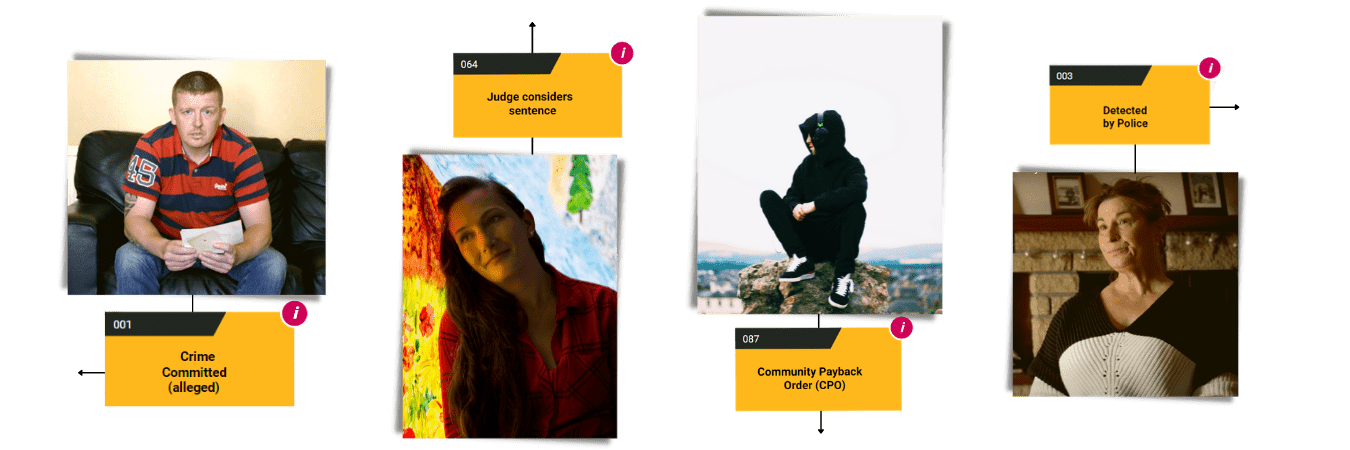
Last year, Community Justice Scotland launched a first of its kind interactive, digital map of the Scottish Justice System. The map shows the range of possible journeys from an alleged crime through to multiple exit points, providing key information and statistics about each step.
There is now the option of exploring the map through the real stories of people who have experienced it. Visitors can follow Malky, Morag, Jack or Lucy’s story and the corresponding stages within the justice system. These stories are taken from our flagship campaign Second Chancers.
The digital Scottish justice system map is part of our ambition to create a robust evidence base which will increase understanding, inspire innovation and make Scotland better for all of us.
Experienced voices: A Victim’s Journey
Recently we launched a series of illustrations depicting real stories from people who have experience of the Scottish justice system. We began with Community Payback Order (CPO), Diversion, Long-term prison sentence and Short-term prison sentence – view these here.
We’re pleased to add a Victim’s Journey illustration to the series, created in association with Victim Support Scotland. This illustration is adapted from a real victim’s story. This can be read in full on Victim Support Scotland’s website: Feeling understood helped me find courage | Victim Support Scotland
We hope that these illustrations will help bring greater understanding of the complexities those involved with the justice system face.
[Click on image for full-size]
WATCH: Social Justice in a Brave New World
In Community Justice Scotland’s webinar, Sir Harry Burns, former Professor of Global Public Health and Father Gregory Boyle, Founder of Homeboy Industries talk to Writer, Performer and Broadcaster Byron Vincent about how we make sure we don’t lose the opportunity this moment in history presents for Scotland (and the world). #SmartJustice
Watch the full 90 minutes here!
Social Justice in a Brave New World
We are thrilled to announce our FREE online annual event ‘Social Justice in a Brave New World‘. Join us (virtually) on 11 March 2021 as we bring together two experts in social health and justice to discuss – what’s next?
Over the past year, the world has changed.
However instead of acting as an equaliser, an experience we all shared, COVID-19 has underlined the inequalities in society.
Now that we can start to see the light at the end of the tunnel, it’s time to regroup.
Join us as Sir Harry Burns, former Professor of Global Public Health and Gregory Boyle, Founder of Homeboy Industries talk to Writer, Performer and Broadcaster Byron Vincent about how we make sure we don’t lose the opportunity this moment presents for Scotland (and the world).
– How do we push past pandemic fatigue to rise to the challenges ahead?
– What practical steps do we need to take to improve social justice in Scotland?
– How do we use this moment of transition to work for a better justice system?
Zoom details will be sent before the webinar.
About our speakers
Byron Vincent
Byron Vincent is a neuro-diverse writer, performer, broadcaster and activist with a long and varied career. Byron is a passionate social activist with lived experience of issues around poverty and mental health. He has written and presented many documentaries for BBC Radio 4, often exploring the social problems arising out of poverty, ghettoization and mental ill health. These include ‘Hell Is Other People’ a self-help guide to social anxiety, ‘How To Turn Your Life Around’ and ‘The Glasgow Boys: From Chaos To Calm’ for BBC Radio Four. Byron is a proud ambassador for mental health charity Rethink, an organisation that tackles stigma around issues of mental health.
Father Gregory Boyle
Father Boyle witnessed the devastating impact of gang violence on his Los Angeles community during the so-called “decade of death” that peaked at 1,000 gang-related killings in 1992. In 1988, he and parish and community members, started what would eventually become Homeboy Industries, which employs and trains former gang members in a range of social enterprises, as well as provides critical services to thousands of men and women who walk through its doors every year seeking a better life.
In 2014, President Obama named Father Boyle a Champion of Change. Currently, he serves as a committee member of California Governor Gavin Newsom’s Economic and Job Recovery Task Force as a response to COVID-19.
Greg’s upcoming book The Whole Language (out Oct 2021) invites us to treat others—and ourselves—with acceptance and tenderness.
Sir Harry Burns
Sir Harry Burns graduated in medicine from Glasgow University in 1974. He worked at the Royal Infirmary, Glasgow where he was appointed Consultant Surgeon in 1984 and Medical Director in 1990. The experience of working with patients in the east end of Glasgow began his lifelong interest in the complex inter-relationships between social and economic status and illness. He was Knighted in 2011. In 2014, he became Professor of Global Public Health at Strathclyde University.
New measures from Scottish Government to reduce unpaid work backlog
The Scottish Government has announced measures to help ensure the justice system can operate effectively due to the impact of the coronavirus pandemic.
It would mean the backlog of unpaid work hours in existing community payback orders could be reduced by 35% with the exception of those imposed for domestic abuse, sexual offences, or stalking – although the majority of sentences will be successfully served. We speak to one man who knows first-hand the benefits of community sentences.
Malcolm ‘Malky’ Paul believes everyone deserves a second chance – and he’s made the most of his. He’s spent time in prison and also served a community sentence after his life spiralled out of control through drink and drugs when he was in his early 20s.

But after turning his life around and freeing himself of his addictions he is now a Health in Mind peer support co-ordinator for people who’ve been sentenced to carry out unpaid work in the community as well as helping others dealing with mental health and substance misuse. Watch Malky’s ‘Second Chancers’ story.
“No one wakes up and decides to be a criminal. For me the addiction and criminality went hand-in-hand. I was always drinking and due to traumatic experiences I’d been through, I hadn’t dealt with issues.”
Malky, now 43, from Midlothian, carried out 240 hours of unpaid work in the community. The work involved painting homeless accommodation and helping move furniture.
“Unpaid work in the community is not a soft option. I think prisons are an easier option. But it’s just hiding people away and not dealing with the issues. That’s not going to help stop them reoffending. I understand there will be certain crimes where people need to be locked up but for many others I think work in the community is better than a short prison sentence.
“Now I can really see how it can transform lives as I work alongside the unpaid work team in Midlothian and see how they want to give back to the community. Giving people short sentences and putting them in prison does more harm than good. Putting them around other prisoners where the peer pressure is pretty hard to stay in that world can affect them in the longer term.
“But if you’re putting them in the community, giving them skills, helping them deal with issues and showing them it doesn’t have to be the criminal way of course it’s going to lower offending.”
Midlothian unpaid squads have continued to deliver projects during the pandemic from making masks to transporting food parcels. But the Chief Medical Officer is now recommending face-to-face unpaid work be suspended in council areas under enhanced level four stay-at-home restrictions.
Now there’s a plan for the backlog of unpaid work hours to be reduced.
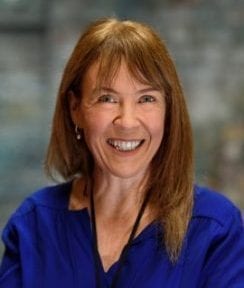
Karyn McCluskey, Chief Executive of Community Justice Scotland, said:
“A Community Payback Order – or unpaid work – takes place in communities across Scotland and allows people to settle their debt to society. It keeps people in the community, in jobs and connected to family and support networks.
“During these extraordinary times, essential public health restrictions have resulted in some incredibly tough decisions to keep people and our communities safe. This measure demonstrates a clear commitment to public safety and the well-being of our dedicated justice workforce who have continued to support people and supervise projects since the beginning of the pandemic.
“Communities have benefitted from around 8 million hours of unpaid work carried out by people serving community sentences since 2011. Unpaid work projects across Scotland have continued to transform outdoor spaces and provide critical support to communities, such as transporting food parcels to the vulnerable, when and where it’s been safe to do so.”
We have produced this handy graphic (click to enlarge) to demonstrate the benefits of unpaid work being carried out before, and throughout the pandemic:
Experienced voices share their justice journey
Our latest piece of research “Rules for Them and Rules for Us” is now available to read. This brand-new research maps the real-life stories of participants against the complexities of the Scottish justice system. The experiences also bring to life Community Justice Scotland’s Navigating Scotland’s Justice System digital resource which shows the different routes and outcomes individuals may face.
Alongside “Rules for Them and Rules for Us”, we have created a series of illustrations which map four different #JusticeJourneys: Community Payback Order (CPO), Diversion, Long-term prison sentence and Short-term prison sentence.
We hope that these illustrations will help bring greater understanding of the complexities those involved with the justice system face.
Samantha Reekie, Improvement Lead at CJS said: “In mapping out and exploring the complexities of the justice system, we can highlight the ways in which people experience these processes with a view to making targeted improvements going forward. But we must also consider how we can better support individuals at all stages to take ownership of their journey and view themselves as participants rather than mere subjects of the justice process in Scotland.”
Community Payback Order
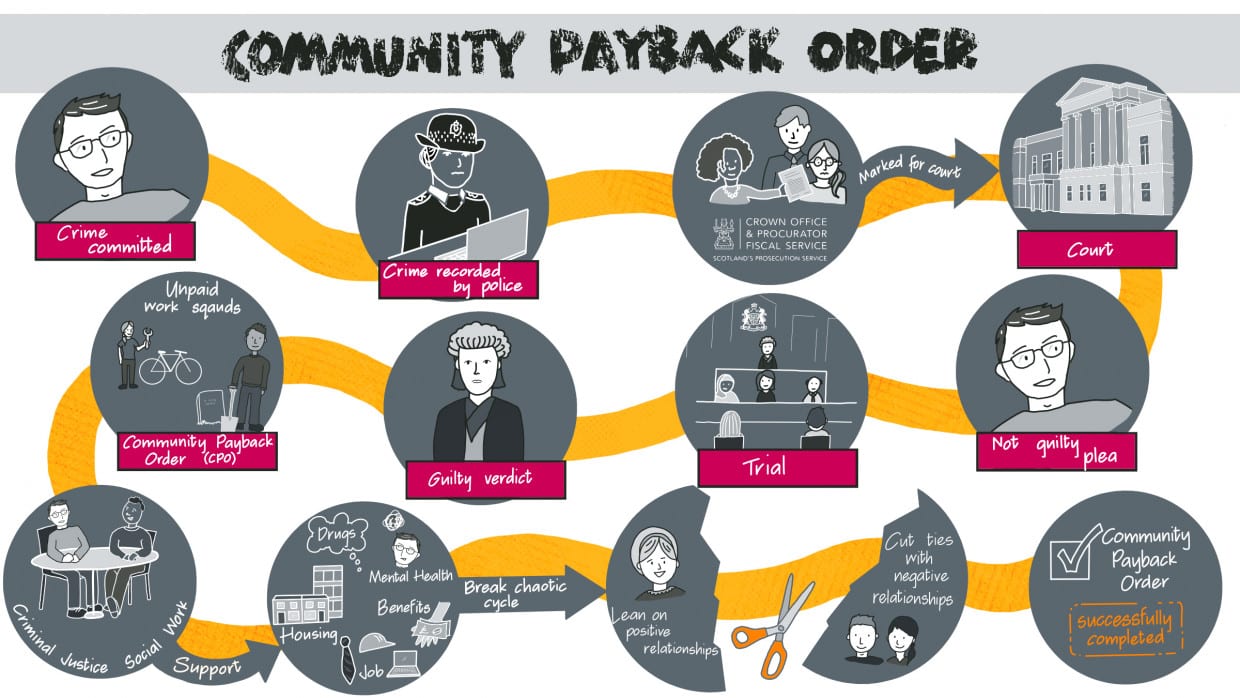
Diversion
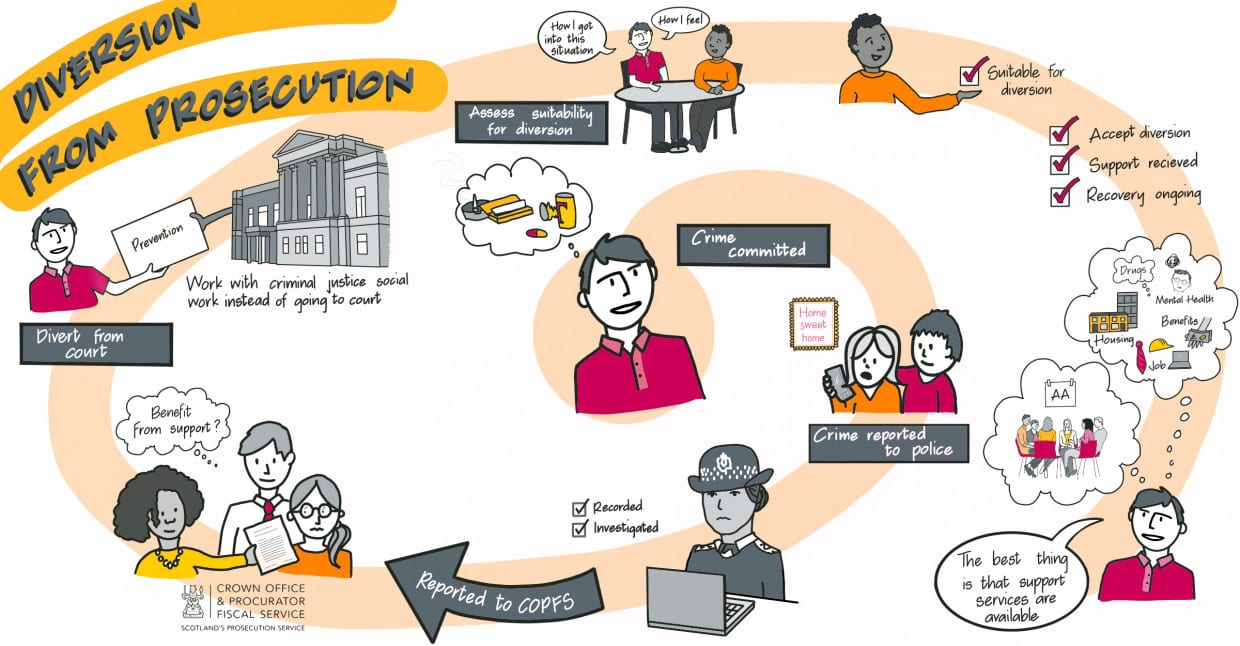
Short-term prison sentence
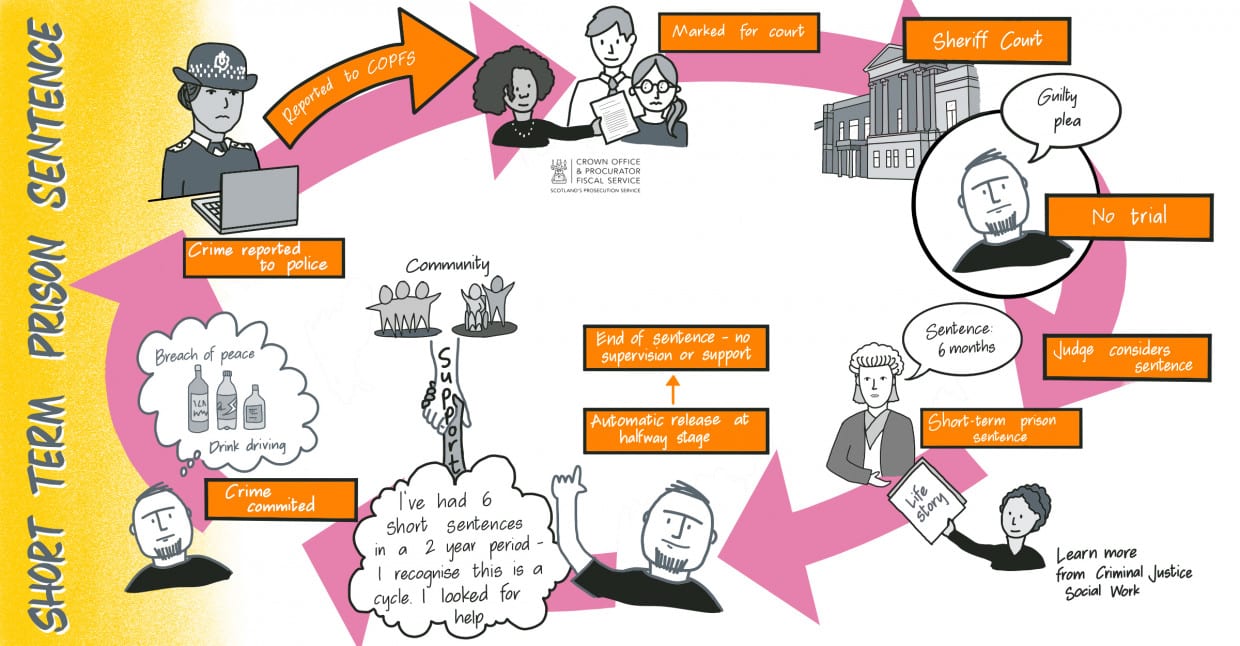
Long-term prison sentence
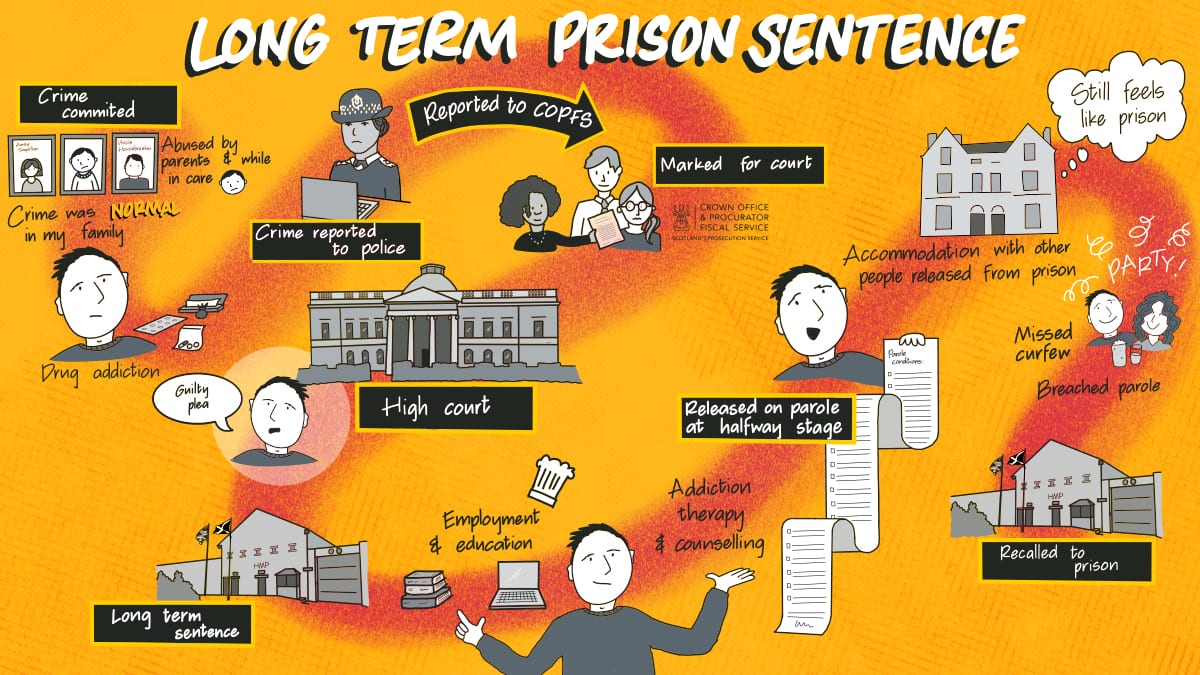
NAVIGATING SCOTLAND’S JUSTICE SYSTEM: LAUNCH OF A NEW DIGITAL RESOURCE ON 29 SEPTEMBER 2020
Here at Community Justice Scotland, we are committed to changing the conversation about justice, increasing understanding and support for what will make Scotland better for all of us.
This vision will only be possible with support from across our society, including justice partners, third sector, those touched by the justice system, the public and beyond. All of us, together, are vital in helping to drive awareness, improvements and a better understanding.
However, to further improve the justice system, we must first understand it, the processes involved and the complexities that people face when navigating it. To that end, we have created an interactive, digital map which outlines the key stages of the Scottish justice system. This first-of-its-kind map shows the range of possible journeys from an alleged crime through to multiple exit points, providing key information and statistics about each step.
Launching on Tuesday 29 September 2020, our map is part of our ambition to create a robust evidence base which we hope will increase understanding and inspire innovation. Soon after we launch, we will run a series of activities which will encourage key audiences to think about justice. And, we’d like you to get involved – here’s how:
- Social media. Through the Community Justice Scotland Facebook and Twitter accounts, we will make digital content available, including visuals and information about the map. We would appreciate your support in sharing our messages through your own social media channels, please use the hashtag #smartjustice
- Creative materials. Please feel free to embed the map, animation and digital banners into your own work including websites, newsletters, intranet etc. For the original file version(s), get in touch: infocommunityjustice.scot
- PR. We want to encourage people to think about the justice system, and how complex it is. To help explore this, we will release a series of blogs, Talking Justice, from professionals across a range of sectors. This ‘call for action’ looks at the bigger picture, so that readers can start to connect how various stages of the justice system can tackle the underlying causes of crime by offering treatment, rehabilitation, training and support. Each week, we will publish our blogs here, please read, comment and share with your networks.
You can access Navigating Scotland’s Justice System here: https://cjs.uniondigital.uk/scottish_justice_system/

